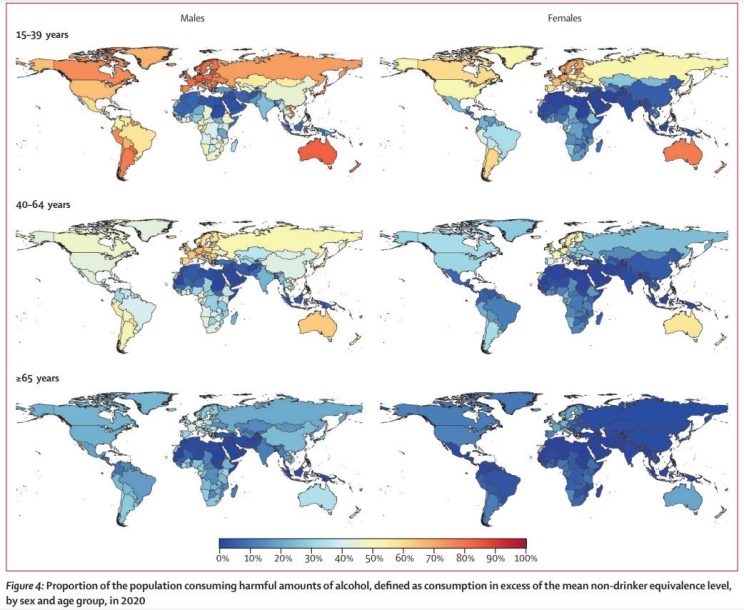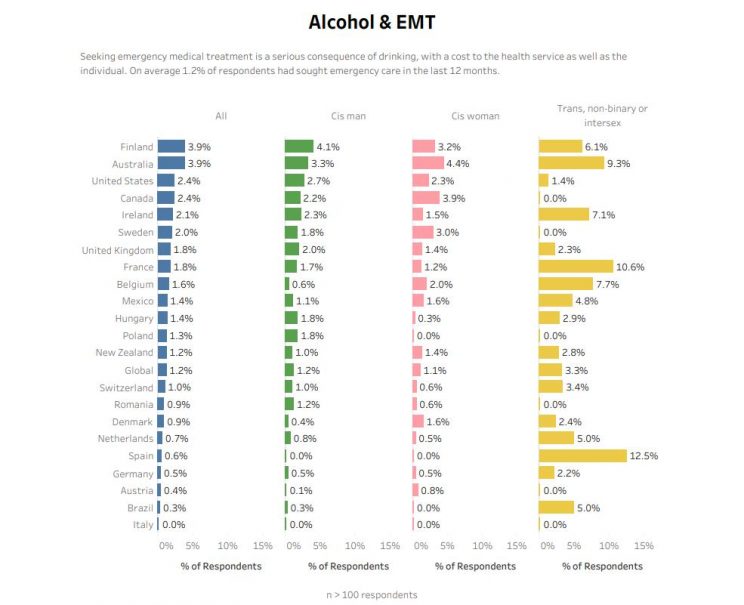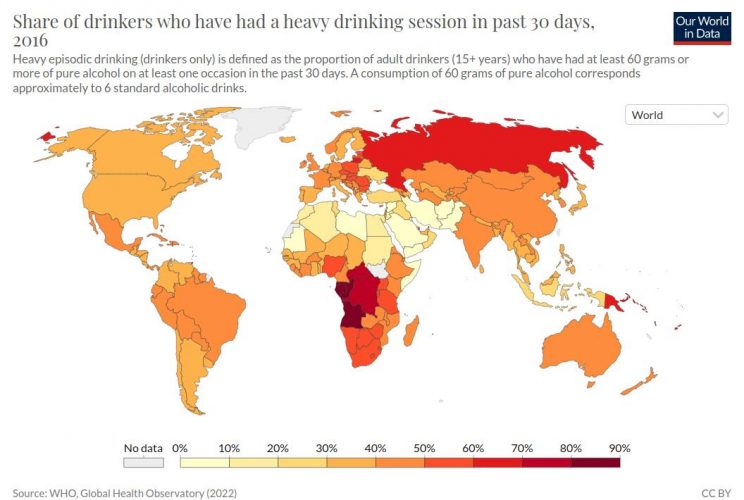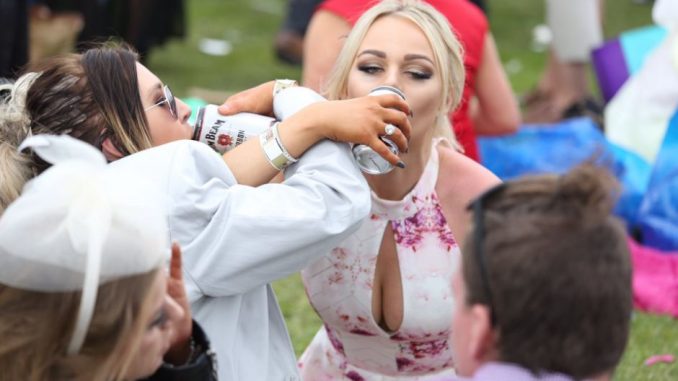
In my previous article, I discussed the mythical alcohol J-curve and explained why moderate alcohol consumption does not confer health benefits compared to teetotalling. I further explained why the recent Gates-funded study that suggested otherwise was marred by false assumptions and deficient methodologies.
That study, however, did confirm something any rational person living in Australia could tell you:
The country has a major drinking problem.
Not just among males, but also among the female population, who have been brainwashed by decades of twisted feminist ideology and mainstream electronic dope into believing women have just as much right to participate in mindless, demeaning and self-destructive behaviours as men.
I'm quite confident getting shit-faced, placing one's self at heightened risk of sexual predation, and engaging in sloppy, drunken hook-ups were not at all what the women's emancipation movement of the 1800s had in mind as it began its noble fight for gender equality. These women battled for the right to vote, to own property and to not be treated in the eyes of the law as mere kitchen- and laundry-bound chattel.
This was a truly worthy movement seeking the same fundamental rights as men. Unfortunately, it was hi-jacked beginning in the late 1960s by angry, self-aggrandizing activists driven by irrationality, self-entitlement and - most ironically for a supposedly 'anti-sexism' movement - vengeful misandry. How the sufferage movement came to be expropriated by a bunch of largely hateful lesbians overtly hostile to the nuclear family unit will be discussed in a coming article; for now, let's get back to alcohol, Australia and their place in the drug-addled New World Order.
Drunkenness, What is it Good For? (Absolutely Nothing)
Let's be perfectly honest and identify excessive alcohol consumption for what it is:
A voluntary and often socially acceptable form of self-harm.
Copious drinking may not be as graphically self-violent as cutting into one's own skin, but don't kid yourself about the highly destructive potential of boozing. Globally, alcohol causes five times the global disease burden caused by illicit drugs.
That's right: Every year, all around the world, alcohol causes more disease and death than meth, heroin, cocaine, marijuana et al combined.
Globally, alcohol is the eighth leading preventable risk factor for disease.
Alcohol is the largest risk factor for disease burden in those aged 25-49 years, and the second largest risk factor in the 10-24 years age group.
Straya, Mate
In the Global Burden of Disease 2020 Alcohol Collaborators study I recently discussed, researchers analysed the level of harmful drinking in countries and regions around the world. In the discussion that follows, I'm going to focus on Australia's ranking in this and other alcohol surveys. Not just because I live in Australia, but because there are a numerous important lessons to be learned from the country's highly dysfunctional attitude towards alcohol consumption.
As the above image from the GBD analysis shows, Australians in the 15-39 age group engaged in some of the highest rates of harmful drinking in the world between 1990-2020.
Among Australian men aged 15-39, the percentage who consumed harmful levels of alcohol during that period was 83.5%. They were surpassed only by those in Lithuania (85.3%), the supposedly happy socialist utopia of Denmark (85.2%), Saint Vincent and the Grenadines (85.2%), Estonia (84.9%) and Germany (83.6%). Trailing closely behind Australia was New Zealand, where 81.7% of men aged 15-39 reportedly consumed harmful levels of alcohol during the same period.
When it comes to women, the figures for Australia are especially shameful. Around the world, women tended to have lower rates of harmful alcohol consumption than men. In keeping with other 'affluent' countries, however, the difference in Australia was small. Between 1990-2020, 78.1% of Aussie women aged 15-39 consumed harmful levels of alcohol - a mere 5.4% difference from the rate seen in their male counterparts.
This gave Australian women the dubious honour of having the world's highest rates of harmful alcohol consumption in the 15-39 age group for females.
Aussie, Aussie, Aussie!
Again, New Zealand women in the same age grouping weren't far behind, with 75·6% drinking harmful amounts of alcohol during 1990-2020. The corresponding figure for NZ men in the 15-39 age group was 81·7%.
You can be sure a lot of Australians will read this and beam with pride, which shows you just how messed up the culture is here.
 Even paper serviettes in Australia encourage you to get stupidly drunk.
Even paper serviettes in Australia encourage you to get stupidly drunk.
Other Data on Drinking in Australia
A recent editorial in the Murdoch-owned Sunday Mail, the main weekend paper in South Australia (a place famous for churches, pedophiles and serial murders), congratulated Australians for their alleged declining alcohol consumption. The author's sole source for this contention was a March 2022 release by the Australian Bureau of Statistics (a federal government agency). In 2020-21, people aged 18 years and over were asked whether the amount of alcohol they usually drink had changed or stayed about the same since the same time 12 months ago.
The ABS data was collected via a self-completed online form. Of the households across Australia invited to participate in the survey, 11,110 fully responded (approximately 35% of the sample approached).
According to the ABS survey results, of those who consumed alcohol:
-Two thirds (66.4%) reported their consumption had stayed about the same
-Nearly one in four (23.9%) reported decreased consumption
-One in ten (9.8%) reported increased consumption.
The Sunday Mail author cited the greater number of respondents claiming to have drunk less, rather than more, as proof that Australia had embraced a more mature approach to alcohol consumption. In the tradition of appalling research that predominates Australian mainstream media, he failed to mention other recent surveys with less flattering results, and even ignored less-than-flattering figures from the ABS release itself.
Among the ignored ABS findings was that one in four Australians aged 18 years and over reported exceeding the Australian Adult Alcohol Guideline in 2020-21 (25.8%), which generously claims healthy men and women can safely drink up to 10 standard drinks a week and up to 4 standard drinks on any one day. The reported gender breakdown of those who exceeded this doubtful advice was 33.6% versus 18.5% for men and women, respectively. Keep in mind that alcohol is generally more toxic to women than men, with females experiencing greater health problems from the same alcohol intake levels as men. The Australian guidelines fail to acknowledge this reality, probably because Australian bureaucracy is 1) largely dumb and incompetent, and; 2) obsessed with appearing non-discriminatory, even when many of its senior members are hopelessly misogynistic/misandrist bigots.
The ABS survey found those aged 18-34 were most likely to have consumed 5 or more drinks on any one day in the last 12 months at least monthly.
Reflecting the country's regrettable drinking culture, people aged 18 years and over born in Australia were almost twice as likely as those born overseas to exceed the guideline (30% compared to 17.3%).
Australia's Response to the COVID Scam: Stock Up on Toilet Paper and Get Drunk
According to the Global Drug Survey, which drew on responses from over 32,000 people from 22 countries, Aussies got drunk the most during 2020. On average, Australians reported getting drunk 27 times in 2020, compared with the global average of 15 times.
Interestingly, Finland and Denmark - both of which routinely top "the happiest country in the world" lists - tied for number 2 spot (despite their reputation as happy socialist utopias, Scandinavian countries tend to have high rates of depression and antidepressant use, which may stem from their northernmost latitudes and accompanying lack of sunlight).
Rounding out the list of countries where people got drunk 20 or more times during 2020 was the US, UK, Canada and Ireland.
As you can see from the graphic below, Australian men won the drunkenness trophy by a clear margin, while Aussie, Danish and Finnish women appeared to be in a neck-and-neck booze-off for first place.
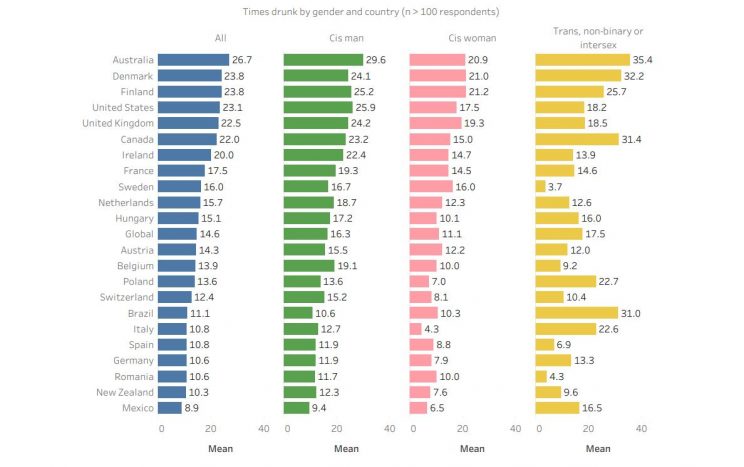 Drunkenness during 2020, by country.
Drunkenness during 2020, by country.
Even Australians categorized as "trans, non-binary or intersex" had the world's highest rates of drunkenness for their gender category. When it comes to "getting pissed" ("Australian for drunk, mate!"), Australia really is a gender-neutral country.
In contrast to the most recent GBD paper, Brazil, Mexico, New Zealand and Germany were among the countries with the lowest rates of drunkenness. They were accompanied by Italy and Spain, where Anglo-Western influences have yet to completely decimate the more moderate Mediterranean approach to alcohol consumption (among respondents identifying with an actual biological gender, Italian women reported the lowest rates of drunkenness in the entire survey, followed by Mexican and Polish women).
Globally, respondents reported regretting getting drunk on 21% of occasions in 2020 – a 9% drop compared to 2019. Australians reported regretting getting drunk on 24% of occasions, with women more likely to regret getting drunk than men.
Australians and Finns also ranked highest among respondents for having had to seek emergency medical treatment due to alcohol consumption. Unusually high rates were seen among those identifying themselves as "Trans, non-binary or intersex," which suggests people in this group are using dangerous amounts of alcohol to deal with the emotional and social issues arising from their situation.
Meanwhile, Aussie women achieved yet another dubious title: They had the highest rate of seeking emergency care due to alcohol consumption among respondents identifying themselves with an actual gender.
There's a lesson in all this: Even if a woman can do everything a man can do, it doesn't necessarily mean she should. Especially when the man she's trying to equal is getting sloshed.
In Australia, there are a lot of misguided men who drink to excess. And, more than any other country in the world, there are lots of terribly misguided women trying to keep up with them.
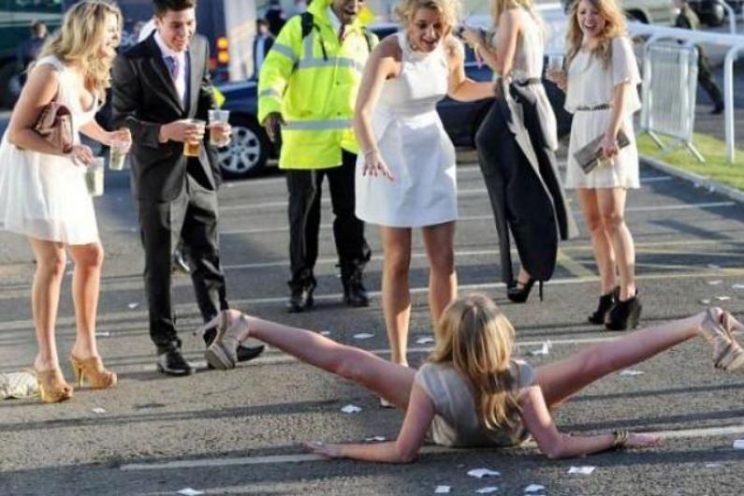 Girls will be boys: Some prime Aussie marriage material on display at the 2014 Melbourne Cup, the great annual Australian drunken shitshow masquerading as a horse race.
Girls will be boys: Some prime Aussie marriage material on display at the 2014 Melbourne Cup, the great annual Australian drunken shitshow masquerading as a horse race.
Other GBD Data
Our World in Data also cites figures from the Global Burden of Disease (GBD) project, in the form of "snapshot" figures from 2016. That year, the percentage of men and women who drank alcohol in Australia was 88.3% and 70.6%, respectively. This was on a par with Germany, and trailed slightly behind Ireland, Lithuania, and Switzerland. Luxembourg had the highest rates of alcohol consumption, with 95.8% and 87.7% of men and women consuming alcohol, respectively.
Of course, the proportion of drinkers in a country doesn't necessarily reflect the incidence of harmful drinking. A country may have a high proportion of drinkers, but if they all drink moderately then there should be little problem.
The following chart was taken from the OWID page on alcohol consumption. It shows the share of drinkers who had a heavy drinking session in the 30 days prior to being surveyed in 2016. While Northern Africa generally shows some of the world's lowest rates of binge drinking (along with the Middle East), further south the African nations of Gabon, Congo, Angola, Central African Republic and the Democratic Republic of Congo reported terribly high rates of binge drinking, upwards of 77%.
No gender breakdown is provided, but with the exception of Gabon (where 54.1% of women consume alcohol) the rate of female alcohol consumption in those countries was quite low (24-38%), around half of that seen among the males.
Australia had a higher rate of binge drinking than the US, Canada and Southern Europe, but was on a par with countries like Ireland, New Zealand, China, Mexico, Brazil and India, all of which had binge drinking rates between 40-50%. In the latter three countries, the rate of alcohol consumption among females was relatively low (Mexico 29.4%, Brazil 27.3% and India 25.4%, respectively), so we would expect males in those countries to constitute the vast majority of problem drinkers (as per the Global Drug Survey).
To no-one's surprise, Eastern Europe showed high rates of binge drinking, with countries such as Poland, Slovakia, Lithuania, Bulgaria, Estonia, Latvia and Russia registering rates of 51-61%.
Getting Drunk Responsibly? C'mon Now...
Government and industry-sponsored research claims alcohol abuse is declining in Australia, but these sources can hardly be considered credible voices on the subject.
The alcohol industry has an obvious vested interest in keeping us all drinking profusely. The Australian government also has a massive vested interest in playing down alcohol-related harms - not just because boozing is rife among politicians and public servants, but because the government draws in huge amounts of taxes, fees and excises from the sale of alcohol.
Australia was the country where gyms were forced to close during the COVID lockdown, but alcohol stores were classified as "essential services" and allowed to remain open (in the state of Victoria, brothels were also deemed essential during lockdown, meaning you couldn't visit your elderly mother to see if she was OK, but you could go have sex with a prostitute who'd already screwed ten strangers that day).
And yet the sheeple here still think the COVID hysteria was about health.
Unlike research by people who need you to keep drinking, the 2019 Annual Alcohol Poll by Australian non-profit Foundation for Alcohol Research & Education (FARE) found a significant increase in the number of Australians drinking irresponsibly.
Just like the ABS survey, FARE found more Australians who claimed to be drinking less than vice versa. But when questioned more specifically about their drinking habits, a far less flattering picture emerged.
The 2019 poll found a steady increase in the number of respondents who drank to get drunk compared to 2011, when the question was first asked (47% in 2019, versus 35% in 2011).
Extrapolated to the wider population, that equates to almost six million Australians who drink to get drunk. For a country of only 26 million people such a figure may seem incredulous to outsiders, but again, any sober-minded person who has observed the culture here first-hand will likely sigh and nod in agreement.
Five percent of respondents reported drinking to get drunk at least twice a week, 10% reported drinking to get drunk once a week, while another 10% reported drinking to get inebriated at least once a month.
Australian men (51%) were more likely to drink to get drunk, but women weren't far behind at 43%.
The research again found alcohol abuse disproportionately common among younger folks, with 18-24 year olds (76%) more likely than 25-34 year olds (65%), 35-49 year olds (47%) and those 50 years and over (18%) to drink to get drunk.
And here's the real cracker: The FARE analysis found 78% of Australian drinkers who consume alcohol to get drunk, and 64% of Australian drinkers who consume alcohol to get drunk at least twice a week, consider themselves "responsible drinkers."
For real.
This is a textbook demonstration of what I refer to as "Aussie Logic" which, translated, means no logic whatsoever.
While Australia is one of the countries where drunkenness is still viewed as funny instead of poor form, the FARE survey confirms that getting drunk is no laughing matter. Thirty-eight percent of respondents said they were affected by alcohol-related violence.
Nearly one in four (23%) parents or guardians with children under the age of 18 years reported their child had been harmed or put at risk of harm because of someone else’s drinking. When asked in what way their child was harmed or put at risk, they most commonly reported a child had been verbally abused (11%), physically abused (8%), neglected in some way (8%) or traveled in a car with a driver who was over the legal blood alcohol limit (8%).
The proportion of children reported by parents to have been physically abused because of someone else’s drinking increased in 2019 (8% up from 5% in 2018).
When respondents Australians who had increased their consumption of alcohol over the past 12 months were asked why, the main reasons included being under more stress than they used to be (31%) and needing to drink to feel happier or they have been feeling depressed or upset (29%).
So much for the "happy-go-lucky, laid-back Aussie" myth (if you've ever observed the way people drive here, you'll already know that legend is complete bollocks).
Other reasons cited by those boozing more included socializing more or going out more to pubs and clubs (40%), their friends or family are drinking more (23%), that their circumstances had changed (21%), and they have more money than they used to and can afford to drink more alcohol (16%).
Australia's Toxic Drinking Culture
Back in the mid-90s, a close friend visited the USA. He boarded a shuttle bus in San Francisco and began chatting with the driver. After confirming the origin of my friend's accent, the driver promptly declared:
"You Australians aren't a very bright bunch."
Somewhat taken aback, my friend asked what the driver meant.
The driver explained that, of all the different cultures he'd dealt with, Australians were the least able to control their drink. No other group of people he'd met in the course of his work displayed such a reckless, pointless approach to alcohol consumption. They seemed to drink for no other reason than to get stupidly drunk, then behaved like annoying dickheads as they celebrated the utter non-achievement of harming their bodies.
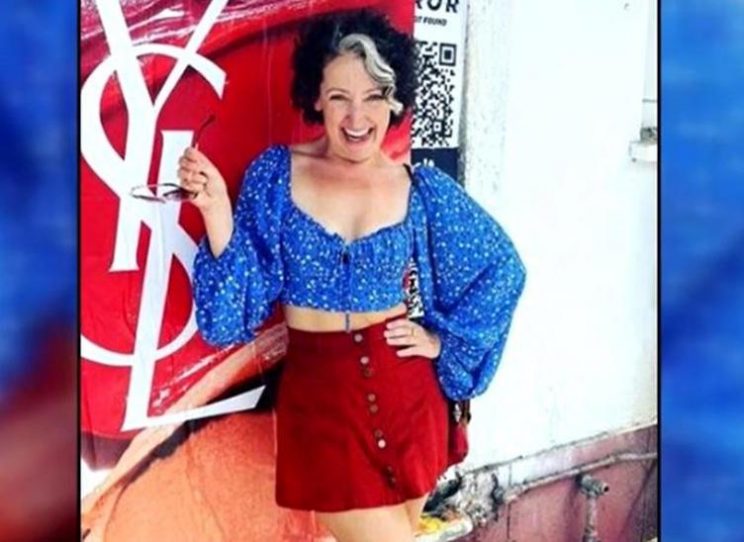 This 37-year-old Australian woman was recently arrested at a Santa Monica restaurant after allegedly getting shit-faced, throwing a drink at another customer and their two-year-old child, yelling expletives and biting an officer when cops arrived on the scene. Her bail was set at US $25,000 which, at current exchange rates, could have bought 643 cartons of Crown Lager - she must be "spewing" ("Australian for regret, mate!")
This 37-year-old Australian woman was recently arrested at a Santa Monica restaurant after allegedly getting shit-faced, throwing a drink at another customer and their two-year-old child, yelling expletives and biting an officer when cops arrived on the scene. Her bail was set at US $25,000 which, at current exchange rates, could have bought 643 cartons of Crown Lager - she must be "spewing" ("Australian for regret, mate!")
My friend, who has always been a moderate drinker, had little choice but to nod in agreement. For many people in Australia, my friend explained to the driver, a great social outing meant drinking toxic amounts of alcohol and getting very drunk. Idiotic behaviour, vomiting, painful hangovers and a next-morning inability to remember what happened were considered perfectly normal sequelae of this eagerly-pursued inebriation. In fact, many Australians considered them a badge of honour and proof of a good time.
Yes, it's an extremely illogical and immature mentality, but hey, we're talking the same country where people think it's a great idea to hide their money in kitchen toasters and 'sanitize' their money in microwaves.
Seriously.
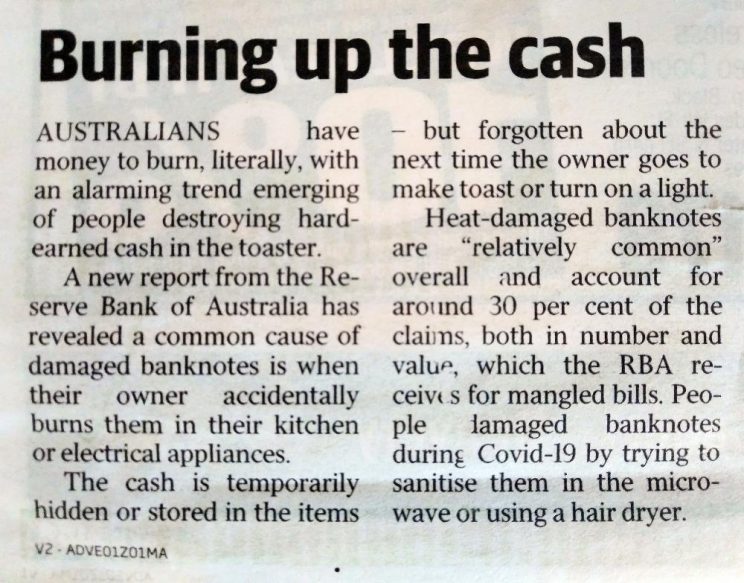 Australia: The country where people think it's safe to store money inside appliances that cook things.
Australia: The country where people think it's safe to store money inside appliances that cook things.
The drinking culture in Australia is so ingrained that many people here tend to regard non- or light drinkers as part of an alien species. In a country where many people think nothing of drinking to the point where they can barely stand upright, those who choose more sober habits are regarded as circumspect.
As part of her 2015 PhD research, Adelaide University student Ashlea Bartram found Australians tend to regard non-drinkers "as a bit suspicious."
When she discussed her findings on 891 ABC Adelaide radio, listeners keenly texted in their experiences.
"People do expect you to explain yourself when you're not drinking," one wrote.
"I don't drink and am constantly having to explain I am not an alcoholic," another said.
In addition to being a suspected AA member, female abstainers faced suspicions of being pregnant.
"I drink very little alcohol in relation to my friends," another listener reported, "and I get the sense they feel I'm judging them when they get boozy, that I'm taking the high moral ground or something."
He's probably right. When people engage in degenerate or self-destructive behaviour, the presence of others who are displaying higher decorum can be unsettling and exacerbate feelings of guilt. I suspect this is a huge impetus for peer pressure: Convincing others to engage in the same questionable behaviour helps people dull such feelings and provides a feeling of validation and reassurance.
Until they get assaulted, injured, imprisoned or killed in a car wreck.
Bali has long served as a debauched playground for drunken Aussie dickheads. In 2019, Nicholas Carr, a 26-year-old apprentice builder from Adelaide, reportedly drank "at least" 10 cocktails before going on an early morning rampage in Kuta. He smashed shop and restaurant windows and assaulted a man sleeping in his bed. He then fly-kicked some poor guy riding along on his scooter, leading to the nasty accident above. The footage above also shows the crazed, swearing Carr jumping onto a car. Locals then chased him down and tied him up with a garden hose until police arrived. Carr apologized after the incident and, in textbook classic Aussie fashion, claimed he didn't remember anything of the incident. Authorities gave him 4 months in a Bali jail to jog his memory.
The Not-So-Lucky Country
Many Australians have a peculiar habit of proclaiming, usually without prompting, that Australia is "the greatest country in the world" and "the best place in the world to live." I've never seen or heard of this phenomenon in any other country. I twice visited the USA in its famously patriotic pre-woke era, but no-one there ear-bashed me about how great their country was. The many charms of pre-COVID era Spain left me mesmerized, but again, no-one there began banging on about their country being the most blessed on the planet.
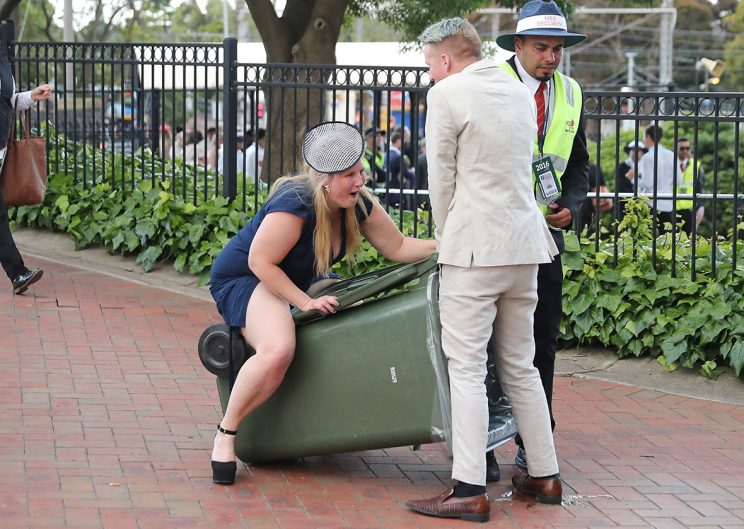 Life in "the greatest country in the world": Two drunken Aussie ferals at the Melbourne Cup try to get a threesome going with a wheelie bin.
Life in "the greatest country in the world": Two drunken Aussie ferals at the Melbourne Cup try to get a threesome going with a wheelie bin.
After observing humans for several decades, it is my experience that when people boast they often do so in order to hide their insecurities or feelings of inferiority.
I've not lived in every country in the world, so am not qualified to state just which one is the best place to live. But I'm guessing whenever this utopia is finally revealed, it will not be a place with world-beating levels of illicit drug use, drunkenness, depression, anxiety, personal debt and antidepressant use. Nor will it be a place with unusually high levels of reported rape and pedophilia.
Which means, it very likely won't be Australia.
More than any other population in the world, excepting the Swiss apparently, Australians have embraced the life strategy of spending money they don't have on crap they don't need in order to impress people they don't like. Thanks to its highly consumerist culture and notoriously steep cost of living, Australia has the second-highest rate of household debt in the world.
As Australians struggle to pay for houses, cars and designer gear they can’t afford, and grapple with utility costs that are among the highest in the world, they are also downing world-beating quantities of prescription and illicit drugs.
Australians and New Zealanders are the world’s highest per capita consumers of cocaine and ecstacy, and second only to North Americans for per capita use of cannabis, amphetamines and pharmaceutical stimulants. North Americans and Australians/New Zealanders also share the world’s highest per capita rates of opioid use (3.6% vs 3.3%, respectively).
Australia is one of the most depressed and anxious countries in the world. A 2015 World Health Organization Report found Australia shared the second highest rate of depression alongside the US and Estonia (Ukraine had the highest rate).
Australia had the third highest rate of anxiety, behind Brazil and New Zealand.
A 2017 JAMA paper by WHO researchers found Australia had the world’s highest per capita lifetime prevalence of generalized anxiety disorder, along with fellow prison island, New Zealand.
Thanks to its high levels of depression and anxiety, Australia is the world’s third-highest consumer of antidepressant drugs, behind the US and Iceland.
Australia has the world’s eleventh highest incidence of reported rape and a sickeningly high rate of pedophilia.
In a 2009 comparison of 22 countries for which data was available, Australia ranked second only to South Africa for the prevalence of sexual abuse of female children. For sexual abuse of male children, Australia ranked sixth behind South Africa, Jordan, Tanzania, Israel and Spain.
A significant volume of research has found that a history of sexual abuse is associated with a greatly increased risk of a lifetime diagnosis of multiple psychiatric disorders, including anxiety disorder, depression, eating disorders, post-traumatic stress disorder, sleep disorders, and suicide attempts.
The Unpalatable Truth
Now here's what no-one wants to hear, especially in Australia where political correctness is as pervasive as drunkenness:
Australia's high rate of sexual predation owes much to alcohol.
Inebriation on the part of the victim, perpetrator, or both is a sickeningly common theme in media reports about rape cases.
And no-one seems to give a damn.
Telling Australians that one of their favourite hobbies - "getting pissed" - contributes to the nation's high rate of sexual predation is never going to be a popular message.
On top of that, we now have the woke/feminazi crowd angrily shouting down advice for women to avoid getting drunk for their own safety as "victim blaming."
For the edification of those too stupid to understand the monumental difference between blaming victims or seeking to prevent people from becoming victims in the first instance, let me explain the concept of situational awareness.
Having Your Wits About You vs Staggering Around Drunk and Attracting All the Wrong Attention
A book I encourage every female I remotely care about to read is Gavin DeBecker's The Gift of Fear and Other Survival Signals that Protect Us From Violence. DeBecker maintains violent encounters aren’t necessarily the random, senseless, unpredictable events most people believe them to be, and that we can all train ourselves to forecast, avoid and deal with them if necessary with surprising efficacy. He's big on listening to that "little voice deep down inside," because it is often talking for a very good reason. What we often call a "hunch" - the sensation that something just doesn't seem right or feeling inexplicably uneasy in a certain situation or around a certain person - may actually be the perfectly rational summation of information that hasn't fully registered in your conscious mind but has been picked up by your subconscience.
The advice in DeBecker's book contributes to the wider concept of situational awareness, the art of avoiding or surviving violent or dangerous situations by 1) increasing your awareness of problematic environments, situations and people (which allows you to avoid them where possible, or take precautions), and 2) recognizing signs and triggers of violence, which endows you with increased opportunities to escape, de-escalate or defend yourself when an incident occurs.
Alcohol is to situational awareness what a torrential downpour is to a camp fire. It impairs your senses and judgement, slows your reflexes, disrupts your coordination and can literally render you incapacitated all on its own.
Again, the woke/feminist crowd are highly opinionated when it comes to this topic but, as the old adage goes, opinions are like arseholes: Everyone's got one.
Your opinion isn't special just because you are adept at ramming it down people's throats. If your opinion is to be considered superior to others, then you must be able to show it is based on a superior body of evidence than the viewpoints you are vigorously shouting over.
So the real question is: What does the actual research show? What do researchers discover when they take the time to survey actual sexual assault victims and perpetrators, instead of self-righteous SJWs and male-hating ideologues?
Stay tuned for my next article...
If You Found This Article Helpful, Please Consider Leaving a Tip
This site is self-funded and relies on reader generosity, so any and all tips are greatly appreciated.
